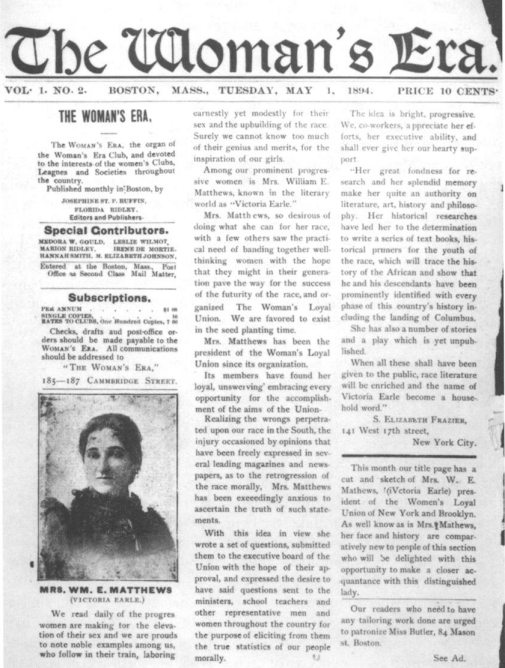

Good Morning POU! We continue looking at trailblazing publications for and by African Americans in the 18th and 19th centuries. Again, “nothing new under the sun”…as you will see with today’s post.

The Woman’s Era was the first national newspaper published by and for African-American women. It was founded in 1886 by Josephine St. Pierre Ruffin, who served as its editor and publisher until 1897. The Woman’s Era played an important role in the national African-American women’s club movement.
In 1892, Boston activist Josephine St. Pierre Ruffin founded the Woman’s Era Club, an advocacy group for black women, with the help of her daughter, Florida Ruffin Ridley, and educator Maria Louise Baldwin. It was the first black women’s club in Boston, and one of the first in the country. Its members, prominent black women from the Boston area, devoted their efforts to education, women’s suffrage, and race-related issues such as anti-lynching reform. Its slogan was “Help to make the world better”. The Woman’s Era, an illustrated monthly publication, was the club’s newspaper. Ruffin served as its editor and publisher; Ridley was also an editor.
Along with articles such as “Club Gossip”, “Social Etiquette”, and “Health and Beauty from Exercise”, the Woman’s Era published news about women’s suffrage in Colorado (the second state to give women the vote), interviews with activists such as Victoria Earle Matthews and Ida B. Wells, a series called “Eminent Women” that included a profile of Harriet Tubman, and criticism of other activists who disappointed them, such as Frances Willard (a white suffragist) and Albion W. Tourgée. (Tourgee founded the National Citizens’ Rights Association, established the historically black women’s college Bennett College, and litigated for the plaintiff Homer Plessy in the famous segregation case Plessy v. Ferguson).
A May 1, 1894 editorial in The Women’s Era, “How to Stop Lynching”, posed this question to readers:
In his very admirable and searching address delivered in this city, April 16th, judge Albion W. Tourgee proposed as a remedy to prevent the lynching of colored people at the South, that the country where lynchings occur be compelled by law to pension the wife and children of the murdered man. This, he said would make murder costly and in self defense the local authorities would put a stop to it. At first blush, this is an attractive suggestion. But why not hang the murderers? Why make a distinction between the murderers of white men and the murderers of colored men?
The editor concluded that the only solution was for the federal government to intervene:
It can go to war, spend millions of dollars and sacrifice thousands of lives to avenge the death of a naturalized white citizen slain by a foreign government on foreign soil, but cannot spend a cent to protect a loyal, native-born colored American murdered without provocation by native or alien in Alabama. Shame on such a government! The administration in power is particeps criminis with the murderers. It can stop lynching, and until it does so, it has on its hands the innocent blood of its murdered citizens.
Conflicts with white suffragists

A prominent white suffragist, Frances Willard, founder of the Woman’s Christian Temperance Union (WTCU) often came into conflict with progressive African-American journalist and anti-lynching crusader Ida B. Wells, a frequent contributor to The Women’s Era. In their push to expose the evils of alcohol, Willard and other temperance reformers often depicted alcohol as a substance that incited black criminality and implicitly made the argument that this was a serious problem requiring a serious cure. The rift first surfaced during Wells’ first visit to Britain in 1893, when Willard was already a popular speaker. Wells openly questioned Willard’s position on lynching in the United States and accused Willard of having pandered to the racist myth that white women were in constant danger of rape from drunken black males to avoid endangering WCTU efforts in the South. She recounted a time when Willard had visited the South and blamed the failure of the temperance movement there on the population: “The colored race multiplies like the locusts of Egypt,” and “the grog shop is its center of power…. The safety of women, of childhood, of the home is menaced in a thousand localities.”
Willard repeatedly denied Wells’ accusations and wrote that “the attitude of the society [WCTU] toward the barbarity of lynching has been more pronounced than that of any other association in the United States,” and she maintained that her primary focus was upon empowering and protecting women, including the many African-American members of the WCTU. While it is true that neither Willard nor the WCTU had ever spoken out directly against lynching, the WCTU actively recruited black women and included them in its membership.
After their acrimonious exchange, Willard explicitly stated her opposition to lynching and successfully urged the WCTU to pass a resolution against lynching. She, however, continued to use the kind of rhetoric that Wells alleged incited lynching. The rhetoric was intimately tied to lynchings in the South, as white women were seen as symbols of innocence and purity that black men could not resist. That rhetoric is exactly what Wells discusses in her pamphlets Southern Horrors and The Red Record as well as articles in The Women’s Era.

In 1895, Ruffin organized The First National Conference of the Colored Women of America, during which the National Federation of Afro-American Women was created. The Woman’s Era became the national news outlet of the club women.
The Woman’s Era disbanded in 1903.
